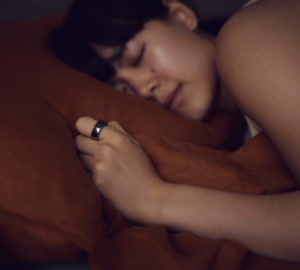When couples hear the word “divorce,” they immediately think the worst. But there’s one case where a divorce could actually make your partnership happier and healthier: a so-called sleep divorce.
If your partner is causing you to get less-than-ideal-sleep (or vice versa), a sleep divorce could be what you need to get your sleep — and relationship — to a healthier place. We spoke to sleep experts to learn more about this concept, who might benefit from it, and how to “consciously uncouple” at night in a way that not only helps you get better shuteye, but also supports your relationship.
What Is a Sleep Divorce?
A sleep divorce is when a couple makes a conscious decision to sleep apart in order to get better sleep. It’s when two individuals in a relationship don’t share a bed, whether it’s for multiple nights, or consistently, says Rebecca Robbins, PhD, assistant professor at Harvard Medical School and Oura advisor.
While the term “sleep divorce” has recently become popularized, many experts on the topic argue that it’s adding a negative stigma to what is often an extremely positive change for couples. On this topic, Robbins cites licensed clinical psychologist and sleep expert Dr. Wendy Troxel, a pioneer of research in this area and author of Sharing the Covers. Troxel notes how sleep divorce is an unnecessarily pejorative term, when there are many instances where this is an incredibly healthy phenomenon, Robbins says.
Neurologist and sleep specialist W. Chris Winter, MD, offers a less demoralizing term to describe the idea of sleeping apart for the pursuit of better sleep: “sleep-cation.” This also nods to the fact that some couples choose to sleep apart some of the time, rather than all the time.
How Common Are Sleep Divorces?
Regardless of what you call it, sleeping apart from your partner might be more common than you think: In a poll conducted on Oura’s Instagram, 51% of respondents said they have considered a sleep divorce. As for the reason: 25% cited different sleeping schedules, 18% cited different sleeping preferences, and 36% cited a sleep disorder.
Perhaps most tellingly of all, 81% of our poll participants said that a “sleep divorce” did improve their sleep quality.
Additionally, in a recent New York Times article on the rise of the sleep divorce, another poll found that one in five couples sleep in separate bedrooms, and out of those who do, two-thirds do so every night.
| Member Tip: In the Oura App, members can use Tags to note nights where they sleep solo or with a partner, as well as sleep disturbances such as “snoring” or “hot bedroom,” to learn how these factors impact sleep quality. |
Who Might Benefit From a Sleep Divorce?
“There are a lot of reasons couples might consider sleeping apart, and many of them are actually extremely healthy,” Robbins points out.
First of all, if you’re a heterosexual woman, research suggests you’d likely benefit from a sleep divorce more than your male partner. An interesting (albeit perhaps not surprising) finding from this 2007 study found that co-sleeping, or sleeping in the same bed, is generally more disturbing for women than for men.
Below, three more of the most common reasons behind a sleep separation:
Different sleep schedules
Differing bedtimes and/or wake times can lead to poor sleep. For instance, maybe you have different circadian rhythms — i.e., you’re an early bird and your partner’s a night owl.
Another example: Perhaps one person works late, and another needs to be at work early in the morning. “One person will be coming in the door, interrupting [their partner’s] sleep while the other is trying to get uninterrupted rest,” Robbins points out.
By sleeping in different rooms, you can minimize the impact one person’s schedule has on the other — leading to better sleep for both partners.
RELATED: Circadian Rhythms and Your Bedtime
Different sleep preferences
Another scenario where a sleep divorce might come into play is if partners have different ideas about their ideal sleeping environment — for example, you need near-total silence to sleep, while your partner loves to fall asleep with the TV on; or maybe you love a cozy, soft bed while your significant other prefers a firm mattress.
These differences in sleep preferences could make it harder for both of you to get the sleep you crave, Robbins says. By sleeping apart — and each partner designing their own beds and rooms up to their own standards — each person can sleep in an environment that feels best to them, without negatively impacting their partner.
READ MORE: How to Choose the Best Bedding for a Better Night’s Sleep
Sleep disorders
Finally, a situation where couples may benefit from a sleep divorce is “in the case of a sleep disorder,” says Robbins. This can include snoring, or an untreated sleep disorder, like sleep apnea, which can cause loud snoring.
Many people receiving treatment for sleep disorders end up using a CPAP (continuous positive airway pressure) machine, Robbins notes, which can be loud and make it hard for their partner to fall and stay asleep. Sleeping in different rooms removes that distraction, allowing both partners to get the rest they need to feel their best.
RELATED: Can Mouth Taping Reduce Snoring?
3 Steps to a Successful Sleep Divorce

Regardless of the reasons, if you and your partner are distrupting each other’s sleep, sleeping in separate rooms can help you get healthy, high-quality sleep. According to Robbins, some of those benefits include increased happiness, better health, higher productivity, and improved relationships.
As Troxel points out in her research, remember that sleeping apart is not necessarily an indicator of an unhappy or unhealthy relationship. In fact, it’s crucial to speak openly about your sleeping habits in order to sleep better — and perhaps have a more positive relationship — in the long run.
Below, a few tips to make it work not only for your sleep, but also for your relationship:
1. Determine if you need one
Before you set up shop in the guest bedroom, it’s important to determine if you actually need a sleep divorce. If not, you could be missing out on a number of benefits of sleeping with your partner.
For example, if you and your partner have a healthy, happy, long-term relationship, co-sleeping (or sleeping in the same bed) could lead to better quality shuteye for both. One study “revealed that those in longer-running relationships did demonstrate improved sleep outcomes over those in shorter-term relationships,” says Robbins.
Sleeping next to your partner (and the snuggling that goes along with it) can also help you both release oxytocin. According to another study, “oxytocin could be a potential neurobiological factor linking close relationships with sleep, and ultimately, health for both individuals in the relationship,” says Robbins.
So, “the first question to ask yourself is, ‘Is my partner’s sleep disrupting mine?,’” says Robbins. If so, the negative health outcomes of getting inadequate sleep probably outweigh the benefits of sleeping next to your partner — in which case, you might want to consider sleeping separately.
2. Make time for intimacy
Intimacy — whether it be talking about your day, snuggling, or having sex — often happens in the time before bed. But just because you’re sleeping in separate rooms doesn’t mean that you should sacrifice intimacy and all of the benefits that come along with it (including the sleep-supporting oxytocin mentioned above).
So, if you decide to sleep separately, make sure you’re making time for intimacy in a way that’s meaningful for both of you as a couple, says Robbins.
For example, you might make time to connect with your partner every evening before you head to your separate bedrooms, or you might spend 30 minutes cuddling in one bed before the other person heads to their room to call it a night.
The point is, you don’t need to share a bed to share intimacy. But because so much intimacy does happen in bed, if you’re going to be sleeping in separate rooms, it’s important to consciously create space for that intimacy.
3. Make the new space feel familiar
If you’re used to sharing a bed with your partner in your typical bed and environment, going to sleep in another room can feel unfamiliar, which can make it hard to fall asleep, Robbins notes. Or if you’re relegating yourself to a spare room with an uncomfortable bed, take time to make it feel as cozy as the primary bedroom.
“Try to make your new sleeping space feel, smell, look like the bed that you shared with your partner,” says Robbins. “That could help you ease into sleep in that new environment.”
For example, if you’re moving to a guest room, bring your favorite pillow from the bedroom you shared with your partner, sleep in one of their sweatshirts, or invest in the same comforter that’s in your old bedroom. The more familiar you make the new space, the easier it will be to get high-quality sleep — the entire purpose of moving forward with a sleep divorce in the first place.
RELATED: 5 Ways to Upgrade Your Sleep Hygiene
About the Oura Expert
Rebecca Robbins, Ph.D., is an Instructor in Medicine at Harvard Medical School and an Associate Scientist at the Brigham and Women’s Hospital. Her research uses marketing and novel communication tools and technologies (i.e. smartphones and other mobile devices) to design persuasive behavior change interventions to improve sleep and circadian health. In 2011, Dr. Robbins co-authored Sleep for Success! with Dr. James B. Maas. Dr. Robbins’ research has appeared in the New York Times, the Financial Times, and Readers’ Digest, and she has appeared on The Today Show, Live! With Kelly Ripa and Ryan Seacrest, Fox Business News, ABC Nightline, CNBC, and CBS This Morning.











